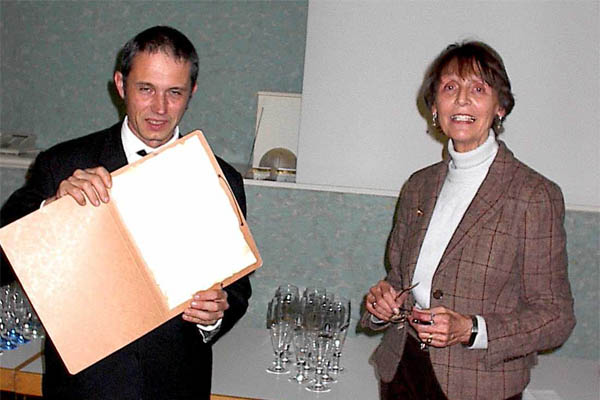Research prize for animal-free cancer research 2006-2011
Thanks to a dedicated legacy, a total of three prizes, each endowed with 10,000 euros, were awarded for cancer research without animal testing in the years 2006 and 2022.
Research prize 2011 - Karlsruhe
Doctors against animal experiments (DAAE) awarded the 10,000 euro science prize for non-animal cancer research to researchers at the Karlsruhe Institute of Technology (KIT). Dr Irina Nazarenko and Dr Stefan Giselbrecht were awarded for the development of an in vitro model of cell communication between tumour and healthy tissue. In an interdisciplinary project of the BioInterfaces programme, the scientists are investigating the communication between tumour cells and stem cells during the development of secondary tumours in different organs, thus making a valuable contribution to the understanding of human cancer. Cutting-edge research techniques are employed to bridge the gap between cell research and engineering science. In the research project, human cells are cultivated organotypically on microstructured biochips in bioreactors, serving as models for bone marrow and breast cancer. These models aim to represent the metastasis processes of breast cancer in bone tissue in a lifelike manner. This innovative approach allows for the development of novel strategies to regulate the behaviour of tumour and stem cells, as well as pioneering therapies in the field of tumour nanotechnology, all without the use of mice, which are traditionally used in this research domain.
The funding for animal-free cancer research was made possible thanks to a dedicated legacy to DAAE. A prerequisite for a project's eligibility for funding is conducting research entirely without the use of animals and animal-derived materials. This includes the culture media for cell cultures and antibodies, which must also be synthetically produced. The award ceremony took place on 10 August 2011, at the Institute for Biological Interfaces in Karlsruhe.

The 3-dimensional cell model as a replica.

Dr Irina Nazarenko demonstrates her work with cell cultures.

Dipl. Biol. Silke Strittmatter (DAAE, middle) with the award winners Dr Irina Nazarenko and Dr Stefan Giselbrecht.
Research prize 2011 - Kiel
Dr Maret Bauer, a researcher from the Department of Gynecology and Obstetrics at the University Medical Center Schleswig-Holstein in Kiel, has been honored with the second Research Award for animal-free cancer research, endowed with 10,000 euros.
As part of her research project, Dr Bauer investigates the influence of the connective tissue in the intercellular space, known as stromal fibroblasts, on the spread of breast cancer. Stromal fibroblasts are part of the healthy tissue that surrounds breast cancer cells and into which breast cancer grows as the disease progresses. They undergo changes in their properties upon contact with tumour cells and can subsequently promote tumour growth and metastasis. By precisely characterizing the interactions between breast cancer cells and fibroblasts, strategies could be developed to ‘normalize’ the stroma, creating a barrier against tumour growth and metastasis. This would represent an innovative approach in the treatment of breast cancer.
"Our research is carried out on a three-dimensional cell culture model. It works entirely without the use of animals and animal derived materials," says Dr Bauer. Tumour cells and fibroblasts are isolated from surgical specimens of breast cancer patients (after the patients have given their prior consent) and then cultivated in a three-dimensional matrix. Now the interactions between the cancer cells and the stromal cells can be studied in more detail and also specifically manipulated. "The growth behaviour of the cells in the 3D culture shows great similarity to the growth in the human breast, so that we have virtually succeeded in mapping the human mammary gland in a simple 3D cell culture model," explains Dr Bauer.
The award ceremony took place on 26 July 2011, at the Department of Gynecology and Obstetrics at the University Medical Center Schleswig-Holstein, in Kiel.

Dr Corina Gericke (DAAE) hands over the research prize to Dr Maret Bauer.

Award winner Dr Maret Bauer in the cell culture laboratory.
Research prize 2006
In 2006 the IT specialist, toxicologist and chemist Dr Christoph Helma of the Centre for Data analysis and Modelling in Freiburg received the science prize for animal-free cancer research of Doctors Against Animal Experiments. The prize of 10,000 euros was awarded to Dr Helma for his work on the development, validation and publication of the computer program 'lazar' (lazy structure-activity relationship). This program can be used to predict the cancerogenic effects of chemicals. It evaluates the chemical structure of an unknown compound regarding its possible cancerogenic properties. The system is very accurate and can replace many animal experiments.

Prize winner Dr Christoph Helma and Dr med Heide Stransky-Gärtner (DAAE).
